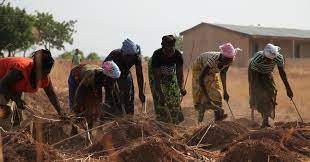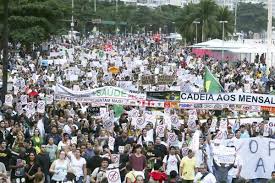
Members of the Rural Women’s Farmers Association of Ghana (RUWFAG) prepare a field for sowing.
The World Economic Forum is meeting this week in Cape Town, with much self-congratulation on “economic growth”, “poverty eradication”, and “women’s empowerment”, all brought by those who engineered a world economy based on growing inequality, galloping individual debt, expanding precarization of labor, and anything but the empowerment of women. Part of this circus maximus is the meeting, held largely behind closed doors, of the partners of the New Alliance for Food Security and Nutrition. Across Africa, women farmers see this “new alliance” as the same old same old, and they’re not buying it.
The New Alliance, cooked up by the G8 and the European Union in 2012, sports all the “right language”: transformation, growth, partnership, security, sustainability, sharing. But the New Alliance opens ever-larger amounts of land to corporate investors and multinational agro-corporations, because nothing says sustainable security like over-the-top investments, land grabs and the forced eviction of local populations. Women farmers’ organizations have decried the physical and cultural violence of this project. They have protested the Alliance’s refusal to consult, and they have shown the devastation this “new alliance” harvests from the destruction of women’s bodies and lives.
But what do women farmers know about food security or nutrition, and, in particular, what do African women farmers know? Once again, they must be saved from themselves.
The premise of the New Alliance is that “land titling” will fix everything. Here’s what’s actually happened. Malawi was induced to release about a million hectares, or 26 percent of the country’s arable land, to large-scale commercial farming. According to ActionAid, “Land titling can give small-scale food producers more security over their land, but in the current New Alliance-related processes, it appears to be a way to primarily help governments facilitate large-scale acquisitions of land. Secure land tenure does not necessarily require individual land ownership but can be achieved with clearly defined and sufficiently long-term use rights over land that is ultimately state property. The abolition of customary or communal tenure systems and their replacement with freehold title and the private land market has often led to extinguishing the land rights of the poor, notably women.”
Notably women. Yet again, the “new” produces wider and deeper vulnerability, especially for women, all in the name of security and sustainability. This new is not so new.
Malawi women farmers are not the only targets. Women farmers in Nigeria, Senegal, and Burkina Faso report the same, as do women farmers in Tanzania. As Tanzanian farmer Anza Ramadhani explained, “We never had a chance to influence the decisions concerning our land and future. There has been no transparency whatsoever. We don’t know if we will be resettled, where it will be or if we will be compensated. We don’t know how much the compensation will be or if it will be at all.”
In Ghana, women farmers are threatened with being forced to give up their control, and knowledge of seeds, by a new law, called the “Monsanto Law”, which would restrict, and even prohibit, storing and trading seeds. This law is a condition of New Alliance aid. The new is not at all new. As farmer Esther Boakye Yiadom explains, “My mother gave me some seeds to plant, and I’m also giving those seeds to my children to plant. So that is ongoing, every time we transfer to our children. And that is how all the women are doing. We don’t buy, we produce it ourselves.” Patricia Dianon, chair of the Rural Women Farmers Association of Ghana and traditional queen, agrees, “After harvesting, the women are able to store the seeds … They are able to dry it, tie it, and preserve it … So when the year comes, they bring these seeds to sow again.” Victoria Adongo, Program Director for the Peasant Farmer Association of Ghana, concurs, “Seed is where you grow your food from. So if you save the seed, then you grow food the following year. It’s very economical because you don’t have to go and buy seed. That is what we farmers have always done … We, the small holder farmers, want to have good lives. We want to be healthy. We have our seed systems that we like and are proud of. So we do not want multinational companies to come in and take over our seed systems.”
In the pursuit of profit, the New Alliance condemns women to “new” lives of increasing, intensifying and expanding vulnerability, hardship, and disposability. Across Africa, women farmers are saying NO! to the international delegation of liars and thieves. They are saying, “We don’t buy, we produce it ourselves. We want good lives. We want to be healthy.”
(Photo Credit: Global Justice Now / Common Dreams) (Video Credit: Global Justice Now / YouTube)

